Tais 30 August 2014: A Nation in Waiting
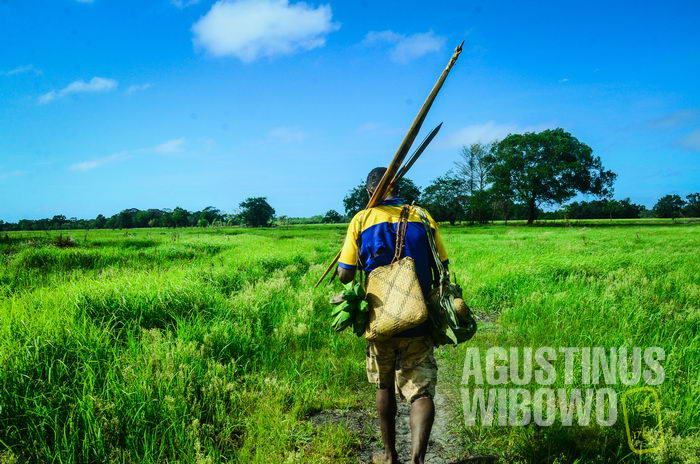 Nobody would deny, Tais is a very blessed land. See how green the vast pasture surrounding the village—even though your economist mind may ask why such a potential fertile land is just wasted and overgrown by wild grass as tall as your chest. See how bountiful their garden products are, their huge yams and blue yams and cassavas and sweet potatos, their super-sweet bananas and super-hot chili and super-fresh coconuts and super-big oranges. When the men go hunting to nearby jungles, they almost never come home empty handed. The people of Tais never ran out of food, as their land provide much more than enough for its 80 families spread in the 1 kilometer breadth of their village.
Nobody would deny, Tais is a very blessed land. See how green the vast pasture surrounding the village—even though your economist mind may ask why such a potential fertile land is just wasted and overgrown by wild grass as tall as your chest. See how bountiful their garden products are, their huge yams and blue yams and cassavas and sweet potatos, their super-sweet bananas and super-hot chili and super-fresh coconuts and super-big oranges. When the men go hunting to nearby jungles, they almost never come home empty handed. The people of Tais never ran out of food, as their land provide much more than enough for its 80 families spread in the 1 kilometer breadth of their village.
Despite of this, you would see the children were very unhealthy; they have skinny bodies of bones but with big bellies. I asked Sisi—my host in this village—why. She just laughed, and said that it was children loved to eat too much.
But I thought it was due to their monotony of diet, most of which was carbohydrate. Their food, if not boiled yam or boiled potato or boiled cassava, then it must be roast yam, roast potato, or roast cassava. Sometimes they add coconut milk as soup. For protein, sometimes they go to the river to catch some fish or have some deer, but you can say it is less than five percent of their diet. And why, I asked, nobody eats green vegetables, or fruits other than banana and coconut?
“That’s what you white Indonesians eat,” says Sisi, “We blacks don’t know much of how to make food. You know I cook much better than all the blacks here, it’s because I learned in Merauke.” Merauke is the border town on Indonesian side.
Besides believing that other countries are by default having better lifestyle, people here also possess unlimited patience. For example, Sisi’s father, raised two cassowaries at his backyard. Cassowary is a huge bird that cannot fly, taller than an adult man, have a strong beak and two legs with thick claws, and its kick is so powerful that it may kill you. It’s difficult to catch a cassowary alive in the wilderness, as it runs very fast and may attack you harshly. When they hunt for cassowary, they usually killed the bird on the spot with their dogs or arrows, then they share the meat for the whole village. But Sisi’s father caught the two cassowaries when they were still babies, then put them in a wooden shed—which he had to separate into two, as two cassowaries inside one cage would attack each other. Sisi’s father had to provide a bunch of bananas to each of the bird three times a day, and the birds looked much healthier than any children in the village.
I asked the old man the purpose of raising cassowaries.
The animals were just good for food; not for it beaks nor beautiful feather (in other parts of Papua New Guinea, they use the feathers to make some handicrafts, but not here). He said he would kill both of them this coming Christmas, as he was too tired of providing food to the animals since two years ago. About cassowary meat’s taste… he closed his eyes, imagining the beautiful meat, “Nothing is better than cassowary’s meat. Very, very greasy!”
So much time and energy being wasted for that one Christmas meal.
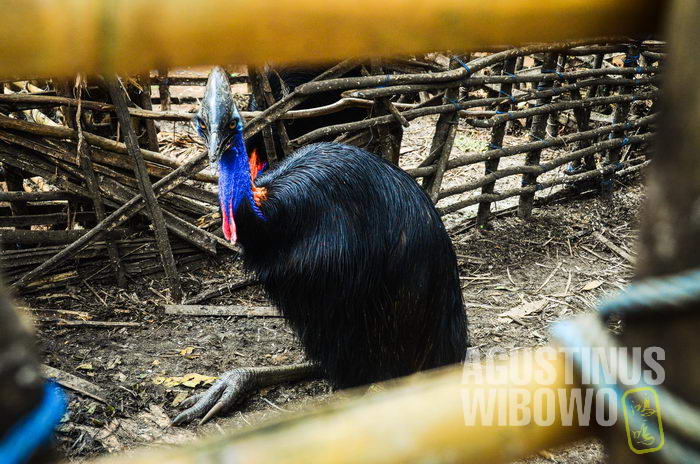
Cassowary in cage
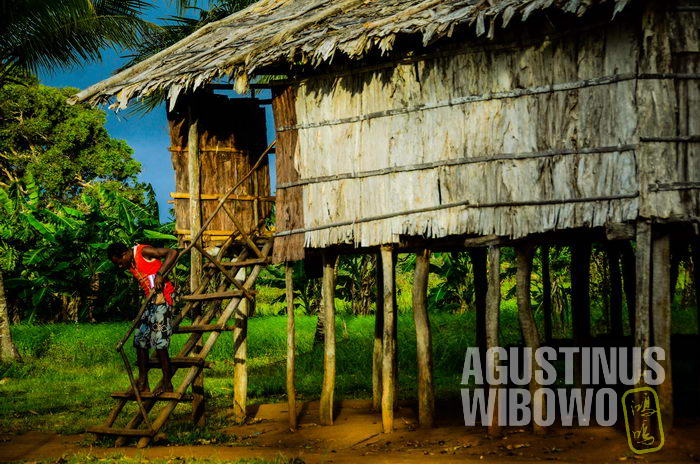
A slow move in Tais
The same goes with the three families raising baby crocodiles. Yes, it’s much easier to catch a baby crocodile than an adult female crocodile (of which technique they also know very well), and the price of crocodile skin without spear mark is slightly higher than the one with. But raising a baby crocodile to an adult one require at least two years of providing kilograms of raw meat every single day. Surely the crocodiles eat much more meat than their owners do, or any of the villagers do. They may get about 700 kina from the coming Indonesian buyers, A$ 300, for skin of one crocodile; and the meat would not last more than three days. Not quite good investment, I thought.
The main problem in Tais is money. Nobody here but Madam Singai the school teacher had salary (500 kina per fortnight); even the village chairman or ‘law and order’ officers worked on voluntary basis. Madam Singai had to travel to Daru—the closest town with banking service, two days of dangerous boat trip—to withdraw her salary. The last time she did it was three years ago, as the bank kept refusing gave her salary with various ‘problem’ reasons. Some men who work as boat operators may still earn some money, but it’s also not much considering the exorbitant price of petrol.
There is no market for them to sell any of their products. Anything they produce have to be consumed immediately as there is no facility for long-term storage. It’s only the Indonesian buyers, who come illegally to the village once in a while, who gave them opportunity of earning some few bucks. Then they would go desperately to find anything requested by the Indonesian buyers: deer horns, fish maws, sea cucumbers. As this might be the sole opportunity for most of the villagers of this cashless economy, they don’t really care if many of the Indonesian buyers pay much below market price, or tricked them with the exchange rate of Indonesian rupiah as long as betel nuts were also provided.
I found it was bizarre, despite of having years of business with illegal buyers from Indonesia, and their proximity to Indonesian border, Tais people are still clueless about the exchange rate. Sometimes 1 kina is 4,000 rupiah, the other day it would be 2,000. Despite of knowing they were cheated, and often they were asked to pay much more expensive for the Indonesian products sold by the buyers, the people of Tais still welcomed the buyers as their saviors, as only from those buyers they receive money.
As token of friendship with the Indonesians, Chairman Singai Suku, the husband of Madam Singai, even named his two grandsons after Indonesian traders of his acquaintances: Abdullah and Maji (it was supposed to be ‘Majid’, but his tongue could not pronounce the difficult Indonesian name). Singai Suku also told me he voted for Sali Subam, an MP from the area, who promised to build roads to connect Western Province to Merauke in the Indonesian side of the border, so people would benefit from Indonesian economy, and Indonesian government would come to look after them here. Five years later, Sali Subam did not deliver the road, and he was not reelected. Singai Suku, instead of blaming Sali Subam, blamed the people of South Fly District in Western Province who were not patient enough to wait for Sali Subam to realize his promises.
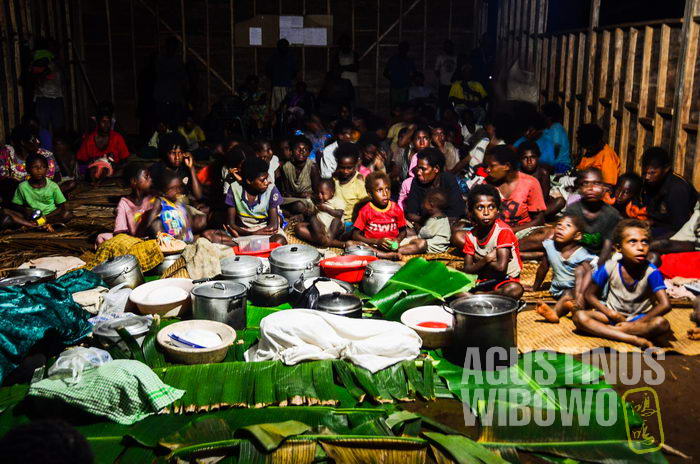
Special meal of fellowship with the visitors from surrounding village.
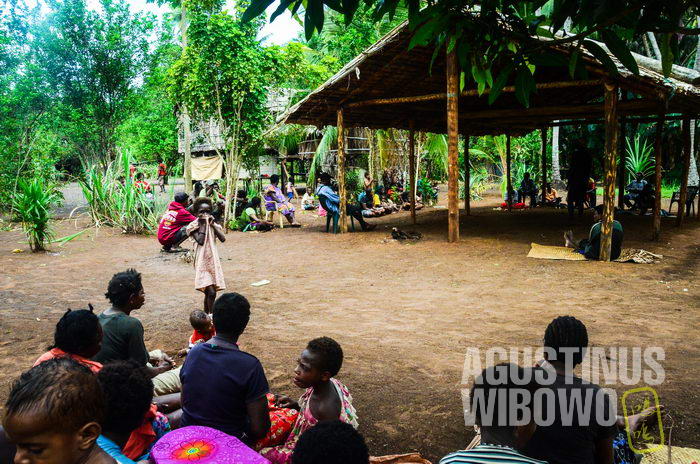
Village meeting to change their fate (hopefully)
It maybe now time to change.
These two days, Tais witnessed the arrivals of three boats bringing dozens of guests from surrounding villages, like Buzi, Sigabadaru, Sibidiri. It was a surprise for this quiet village, as they never received so many visitors at once.
I asked one of the visitors’ leaders on their purpose of visit. Posa Doane, an old and educated man with perfect English said, “We are going to have a meeting to form our own government.” It was not at all a plot to revolt, but to have control on the money for development. “Every province gets aid money from Australia, A$ 3 million, but the money is always cut in Daru because none of the government people speaking our languages. We never receive any projects. We are border people, the closest to Australia, but never benefit from Australian aid. Our money, our right, is always stolen. We go often to Daru to ask for our money, but when we arrive there they always say there is bank problem or computer problem, so we never get anything!”
Posa was a pensioner, used to work as public officer in business development sector, and was graduated from Lae University of Technology. He is one of the most educated people in the whole area. He said the solution of this problem is by forming an association of villages, which is called “Mai Kassa and Wasi Kussa Association”, named after the two big rivers in this region. The people around the two rivers speak several different languages, but they need to work together to confront the dominance of other language speakers in the provincial government. Papua New Guinea is the country with the most number of languages (Indonesia comes second), having more than 820 living languages. Language is identity here, people can be united or confronted by languages.
On Monday, the meeting started two days after the arrivals of those visitors (as they have two Sabbaths: Saturdays and Sundays, when no slightest of works are permitted). The meeting was supposed to start at 8, but nothing happened until 10:30. The leaders of those villages, majority of which were barefooted, spoke in front of hundreds of Tais villagers on their purpose of visit. It was Singai Suku, the village chairman of Tais who is now also barefooted as he was embarrassed to wear half pairs of sandals as he usually does, translated the speeches to local Na languages of the people.
Jack Bagera, the area coordinator from Sibidiri village, a young and muscular man with decisive tone, talked about the importance of forming association of these nine villages, so they would have the rights to decide to use of their own money. “The money is there, but we have no access to it. When we have, whatever project we will fund you. If you want to go to colleges, we will fund you. If you want to start small scale business, we will fund you. Bigger projects will need government approval from Daru, but we will help you. We will have free education, our young boys and girls got trained and educated. Big things will be happening here! Tais will be developed and people will come to work in your land. Tais will not be the same again!”
Everybody clapped.
Posa then talked about how wrong the country is now. “If you go to Daru,” he said, “you will see that all big shops are owned by kongkong (“Chinese”), while we the blacks just sell on the roadside. Why? Because we are not educated. It’s because our government don’t take care of us. If we don’t unite, nobody will listen to us!”
Papua New Guinea is the weirdest country I have ever seen. The land is very good, the resources are abundant, there is no war nor natural disasters. But why all people live in such terrible condition? All businesses are owned by foreigners, from big factories and mining companies until the small shops and restaurants. Even in war-torn Afghanistan, the shops and restaurants are owned by locals.
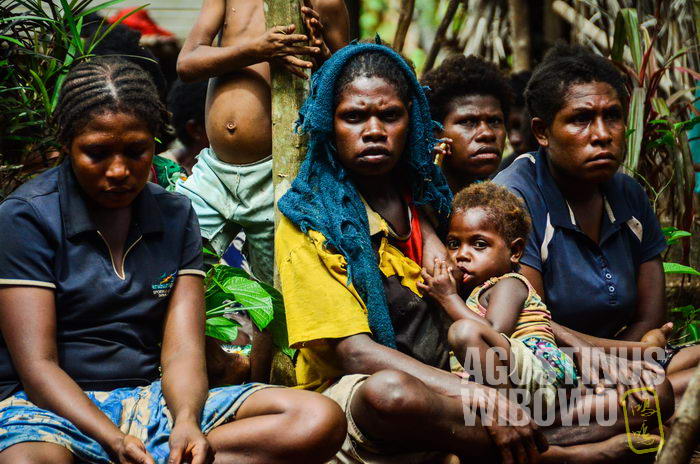
A nation in waiting
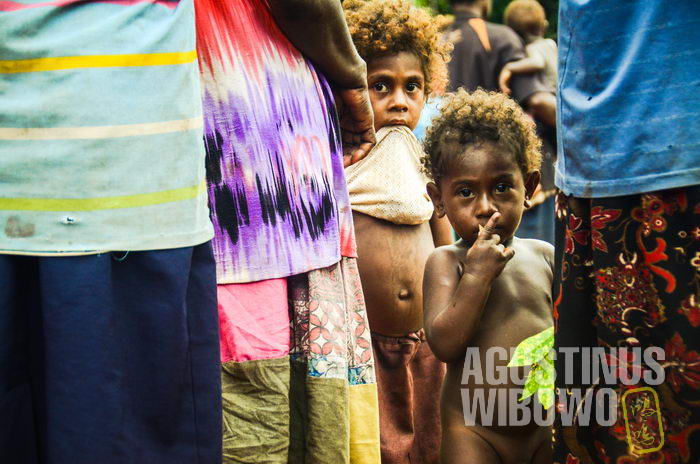
What will be their future?
I sensed a certain of passiveness in the culture of the people. They are fond of waiting. Waiting for changes to happen upon them, waiting for someone to change their life, waiting for money to fall down from sky, waiting for someone fighting for their cause, waiting for road to be built miraculously to their land, waiting for Australia to help them, waiting for Indonesia to look after them, waiting for the kongkong to leave…. waiting and waiting, they don’t really know what they are actually waiting for, and until when. The very waiting culture made them never realized that they have been exploited by outsiders, they became no master in their own land. But life continues, happily in their paradise, with their fateful waiting that one day life would be better. Are those visitors would really fight for the fate of Tais people? The Tais people I asked chose to believe so, as believing otherwise would provide no solution from their side.
I was asked to deliver speech as well. I said, “Dream is important, as by having dreams you know where to go. But stop waiting for anybody to come here to bring you dreams and changes. As the one who just wait, will be the one being used by others.”
Just as what happened to other speakers, everybody clapped.
That afternoon after the village meeting, Sisi my Tais host invited Jack Bagera the Area Coordinator to come inside her post house. In English—the common language between both of them—they were conversing in whispers, as they did not want other villagers to hear. Sisi tried to persuade Jack to be her down-liner in a multilevel marketing business based in the Philippines, selling herbal which they believe to provide fantastic benefits, and now is very popular in Papua New Guinea.
“Pastor Jerki is sleeping in hotel with the money,” said Sisi.
“Jesus!” cried Bagera.
“Rose Kiane went to Brisbane for holiday.”
“Jesus!” cried him again.
“You can be like them. You just need to pay 175 kina for registration fee. When you have 4 down-liners, you will be upgraded to the next level. I am now in Level 4, and I am waiting for my 16.000 kina to come.”
Sisi, an unemployed woman from Tais, had successfully implanted a new dream inside the mind of John Bagera, a man who came to bring dreams to Tais.



Leave a comment